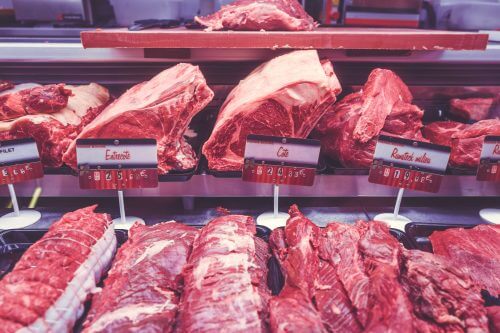20 percent of the meat produced in the world is thrown away. How can we reduce this waste, which harms the animals, the environment and our pocket?

By Mia Falah, Angle, Science and Environment News Agency
"If food waste were a country - it would be the third most polluting country in emitting greenhouse gases into the air," it was determined In a report by the Food and Agriculture Organization of the United Nations. The food industry produces greenhouse gases on a huge scale - gases such as carbon dioxide and methane, which contribute to the greenhouse effect and thus to climate change. If you take into account all the food that is lost throughout the growing, supply and consumption chain, you reach a situation where food waste is responsible for the emission of more greenhouse gases than any other country - except for China and the United States.
The amount of food that is wasted at the various stages of the chain is difficult to digest. A third of the world's food is thrown away, and this is a huge amount - 1.3 billion tons of food! in Israel only 1.865 million tons of fruits and vegetables, 272 thousand tons of grains and legumes, 162 thousand tons of meat products, eggs and fish and 159 thousand tons of milk and its products are wasted every year, which add up to 2.5 million tons of food. This food could feed many mouths, and its waste produces enormous environmental damage, as well as economic damage.
The first and dubious place in the table of wasted food in Israel is occupied, as mentioned, by fruits and vegetables. The reason for this lies in the fact that they are mostly eaten fresh, and therefore many of them are lost during cultivation (after being found unfit for marketing), during packaging, in the truck on the way to the supermarket or in the consumer's refrigerator.
However, when you look at the environmental damage of the lost food, you find that the most serious environmental damage from food loss is caused precisely when we waste meat. The reason for this is that raising animals requires much higher resources than growing food from plants, among other things because it also requires growing food for them, which requires more areas and additional resources to feed them.
The enormous environmental damage of the loss of meat (and of eating meat in the first place) has led many countries to implement programs to reduce the meat consumption of the residents - but there are other ways by which the waste of meat can be reduced, which can be applied in everyday life.
through all flesh
To understand the meaning of the waste of the meat you need to understand the The "environmental signature" of meat production. In a published study By the National Academy of Sciences in the USA, with the Israeli researcher Alon Shpon as his partner, the researchers found that growing animal foods - beef, pork, chicken, eggs and milk - require significantly more resources than plant foods. "We quantified the environmental cost of the animal foods according to the resources required to produce the fodder for them - water, fertilizer and soil," explains Shapon, a doctoral student at the Weizmann Institute of Science and one of the founders of the Forum for Sustainable Nutrition. "We also added the greenhouse gases emitted in the process to this index, and found that the consumption of resources for one calorie of beef is 10 times greater and more than the consumption of resources for other animal products. In addition, the consumption of resources for a calorie of animal foods is greater than the consumption of resources for a calorie of plant products - except for water resources, which are similar."
When it comes to greenhouse gases (gases such as carbon dioxide and methane, which contribute to the greenhouse effect as well as to climate change), UN data reveals that the wasted meat in the world is responsible for 21 percent of all the greenhouse gases emitted by the "wasted food nation". This figure is significant mainly in light of the fact that meat is not the most wasted food item in terms of quantity (this dubious title is occupied by fruits and vegetables in Israel, and in the world by grain crops). The meaning is clear: a kilo of wasted meat is responsible for the emission of much more greenhouse gases than a kilo of other wasted foods.
According to UN data, 20 percent of the world's meat is wasted during its production chain. A report published by the US Department of Agriculture reveals that in 2010, approximately 6.7 million tons of meat were thrown into the trash in the US during the supply and consumption stages alone - this without adding the growing and transportation stages, where additional losses occur. Without going into the moral aspects of raising farm animals in an industrialized way, which become even more jarring when you think about the amounts of meat that find their way to the trash in the end, the environmental aspect of wasting such amounts of meat is very serious: it is not only about the wasted meat itself, but also about water resources, Land, fertilizers, fuel and agricultural crops invested in the production of meat and thrown in the trash along with every kilogram of meat that is wasted - this without even mentioning the amounts of pollution to the soil and water sources and the greenhouse gas emissions produced by the animals raised for the animal food industry, which are also much higher than in any other food industry .
One billion Chinese are reducing their meat consumption

According to the estimates of the Food and Agriculture Organization of the United Nations, by the year 2050 meat consumption is expected to increase by 173 percent, an increase that is largely attributed to developing countries such as China and India - countries where meat consumption on a daily basis used to be the property of the rich only. Today, meat consumption in these countries is on the rise: in China, in the last 30 years, meat consumption per person has increased from 13 to 63 (!) kilograms per year.
Beyond the steps to reduce the loss created after meat production, various countries are beginning to realize that one of the most important tools for reducing greenhouse gas emissions and saving resources is encouraging a reduction in meat consumption in the first place. In the Chinese government, for example, they realized that one of the main ways to reach the emission reduction goals they presented at the Paris Climate Change Conference last December is to announce a plan that will encourage the residents to reduce meat consumption, with the intention of reducing meat consumption in the country by 50 percent and in this way saving about one and a half billion tons of gas emissions annual greenhouse, as well as to improve the health of the country's residents and save money for the health system.
"If we ate food of plant origin instead of animal food, we would be able to produce more food," says Shpon, "because, as mentioned, it takes much more crops to produce animal foods than plant foods. Therefore, in my opinion, eating animal food should be seen as a waste of food. Any reduction in meat consumption means a reduction in the environmental footprint of the food, a reduction that is absolutely necessary - because even in Israel we consume a great deal of meat, far beyond the standard nutritional recommendations and much more than what is accepted in the Mediterranean diet, which has been a common diet in our region for hundreds of years. The price of this - both health and environmental - is very high."
"The biggest challenge for a country on this issue is adopting a policy that will de facto change dietary habits," he adds. "Any policy or initiative aimed at changing dietary habits on a large scale for the benefit of the environment, public health and the economy is welcome. In a recently released report, the researchers propose various strategies that will help implement changes in food consumption patterns, such as raising awareness among the public, offering benefits as a means of encouraging dietary change, creating a space where changes are made easier in light of the psychological barriers to changing consumption habits (for example, offering substitutes that taste similar to meat ) - this while making sure to integrate educational and cultural aspects. It should be understood that since food consumption is embedded in the tradition, culture and lifestyle of any society - it is very difficult to bring about change, and therefore a large-scale dietary change will require the creation of a favorable environment for this and the investment of many efforts.'
Don't forget a shopping list
Until here in Israel, too, the decision-makers begin taking steps to help reduce food losses and greenhouse gas emissions from food to the air, the Think-Eat-Save organization offers some tips To help you be smart and environmentally friendly consumers and to throw less food in the trash, thus you will also save yourself money, and also help protect the environment:
- Think before you buy - check your fridge and pantry before going shopping and make an orderly shopping list and be sure not to exceed it
- Try to shop with specific meals in mind
- Check the validity of your products in the refrigerator and plan to use products whose validity is about to expire
- Make a meal once a week from all the leftovers in your fridge
- Make sure that the temperature of the refrigerator is not too high - it should be aimed at 1-5 degrees Celsius in order to keep the food for a long time

2 תגובות
Food waste comes from two main reasons
* When we shop, we want to see full shelves in stores all the time, so there is a higher production than consumption.
** Many throw away food products immediately on the expiration date, which is of course nonsense. A food product can be spoiled even before the date (if not stored properly) and be excellent even after the date (depending on the product and storage)
*** I often ate cottage cheese or even 4 days after the date, and certainly hard products like chocolate. If the product looks fine and has no unusual smell, it is completely edible.
"The consumption of resources for one calorie of beef is 10 times greater than the consumption of resources for other animal products" - sounds far-fetched and it is not specified which other products are involved.